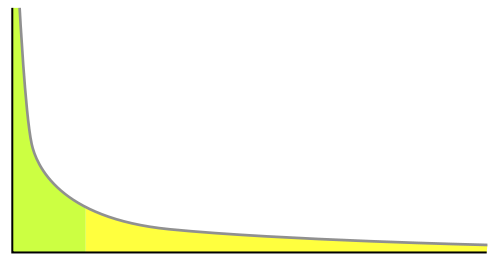Long Term Keywords (tail)
Updated: Sat, 09 May 2015 by Rad
It is much easier to rank for long tail keywords than for more common keywords. Another significant benefit for focusing on long tail keywords is that, although these keywords are used less in search, the visitor that finds your website using them is more likely to buy your service, product or engage with your content.
Targeting long tail keywords make sense because they:
- are more specific and provide better quality traffic and higher conversion rates
- also long tail keywords are less competitive
- they help you state agile
- it helps you to rank for difficult terms
"The longer and more specific the search terms are, the higher the chances of conversion are."
Marieke van de Rakt, https://yoast.com/focus-on-long-tail-keywords/
Hard to rank
In some markets, it is really hard to rank. Some markets are just highly competitive, with large companies dominating the search results. It is extremely hard to compete against big budget marketing campaigns of some large corporate clients.
Instead of focusing on just two or three highly competitive general keywords, it is better to target the dozens or even hundreds of easy-to-rank-for long tail keywords.
Also bear in mind, however, that the downside of focusing too much effort on the long tail is, if you target phrases which are too specific, you might not get enough traffic to sustain your business.

The term refers specifically to the thin long part of the search chart, which shows a long terms search curve that could apply to any industry, from entertainment to hard goods.
According to article "Illustrating the Long Tail" by Rand Fishkin published on moz.com - the top terms account for 3.25% of all search traffic!
- Top 100 terms: 5.7% of the all search traffic
- Top 500 terms: 8.9% of the all search traffic
- Top 1,000 terms: 10.6% of the all search traffic
- Top 10,000 terms: 18.5% of the all search traffic
This means if you had a monopoly over the top 1,000 search terms across all search engines (which is impossible), you'd still be missing out on 89.4% of all search traffic.
With shorter keywords, competition for rankings can be fierce, but visits can be scatter-shot and Return on Investment can be low.
With clever implementation of long-tail keywords, you may pull in less traffic by numbers, but the Return on Investment will be proportionally much higher: you'll be attracting exactly the audience you're looking for, and that audience will be far closer to point-of-purchase than that of your less-savvy competitors.
Keyword research can be a real pain in the ass for content marketers. As noted in Search Engine Journal, the bottom 20% of searches, in terms of volume, generate 60% of conversions! This undeniably confirms the value of the long tail. Long-tail keywords are also less competitive, and therefore less costly to bid on in PPC.
< back to glossary
Long Term Keywords - from around the web
- Latent semantic indexing
- More Traffic; Less Competition: The Long Tail Keyword Mastery Guide for 2020
- Sorry To Burst Your Bubble: The Long Tail Keyword Myth - a post by Wesley Parkey @ clicteq.com (2016)
- The Ultimate Guide for Mastering Long Tail Search
- Why focus on long tail keywords? - an article from October 2014 @ Yoast.com
- Long-Tail Keywords: A Better Way to Connect with Customers
- Illustrating the Long Tail - an article by SEO guru Rand Fishkin, published on moz.com
- Long Tail Search & Web Analytics - Search Engine Journal
< back to glossary